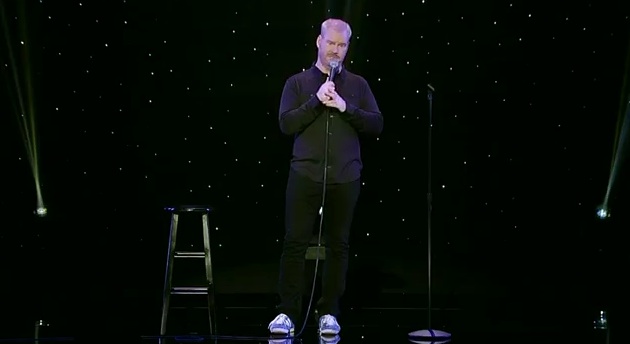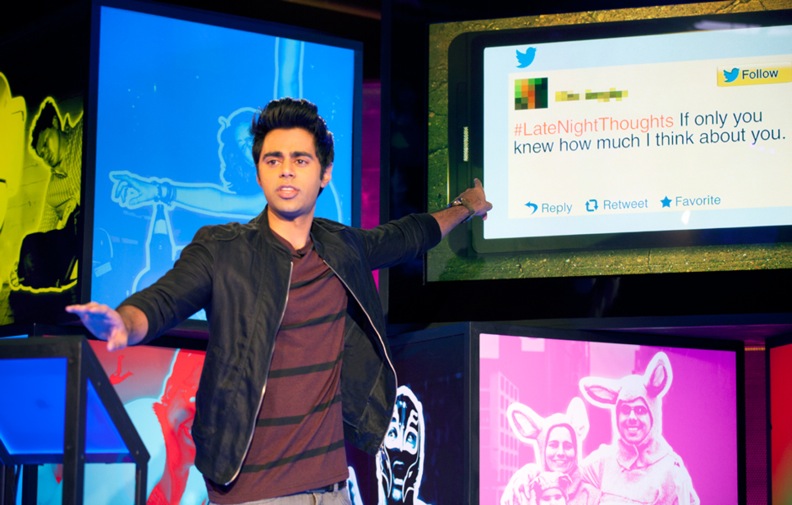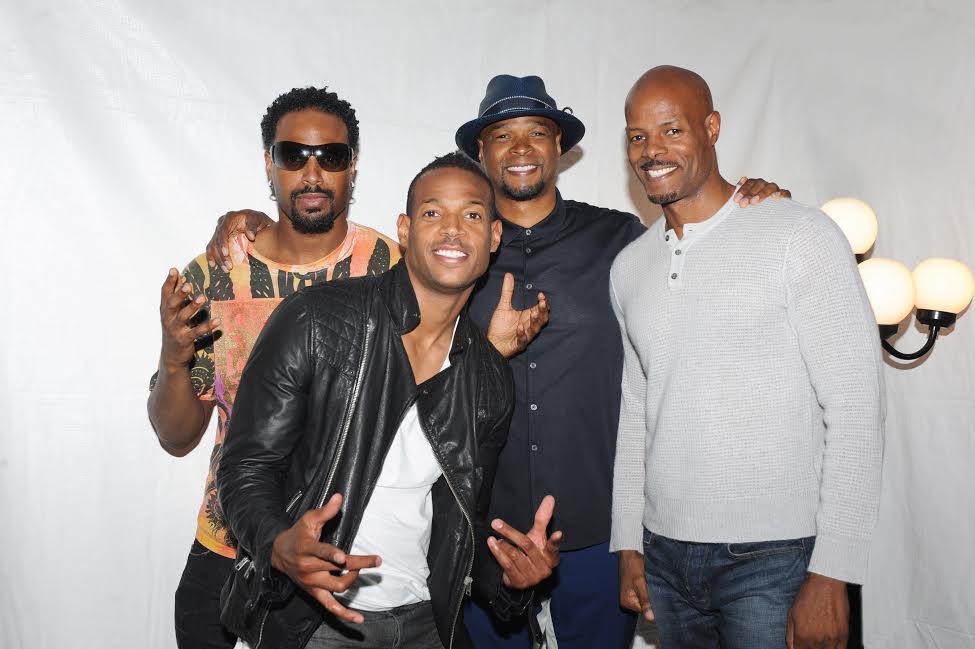Joe Rogan has a new one-hour stand-up comedy special that debuts Saturday, June 20, on SPIKE-TV. Let's talk about it. Better yet, let's talk to Rogan. Actually, here's a great place to start. This is a clip from the special, "Talking Monkeys in Space," in which Rogan talks about how some people are just so set in their beliefs that they came from Jesus that they cannot handle the idea of monkeys and evolution. Tell me I'm not crazy, meanwhile, to think the voice he uses for the Jesus-believer sounds oddly familiar:
Rogan likes taking taboos, whether it's religion, evolution, marijuana use and anti-pot ads, enjoying when animals escape from captivity and display their wild nature, not so much enjoying the idea of people climbing Mount Everest, and really not understanding Dr. Phil.
"I always find it interesting when people will argue without doing zero research," Rogan told me over the phone earlier this week. That's a lot of people, though! "We're definitely dealing with people who aren't thinking. They're just spouting predetermined decisions or proclamations thieir team has made. It seems people adopt this conglomeration of opinions that other people have found for them. As a a staunch conservative, I think this way. As a lifelong Democrat…I BLANK. But there's people for you. Silly monkeys."
I know you talked about this on your blog already. But it's something all comedians have to deal with when they record a special, CD or DVD. How do you let go of a joke, and worse yet, how do you let that joke get recorded on tape when you've later refined it or made it better?
"It sucks, man. Because I just recorded it a couple of months ago, and there are jokes I see and hear, and think, I already have so many taglines that make the joke so much better."
"There's nothing you can do. A lot of comics when they put out stuff too quick, you can listen to those jokes and see those jokes just haven't matured yet…It takes a long time…to get to the best version of it." How do you reconcile that?
"You don't. You keep dong it. You just keep writing it. Doing new stuff. You just have to accept the fact that it's not really done."
So when you watch his special, know two things: 1) That he tells these routines differently already, and 2) he's already trying to move on to the next bit."Things evolve. Your comedy evolves. Bits evolve. It makes it very hard to listen to. With stand-up, it's a constant need for perfection. A desire to try to get things right."
Much, much more…AFTER THE JUMP!
Was Spike a natural fit for you because of your appearances on there analyzing mixed martial arts fighting, or did you have to talk them into getting into the stand-up comedy special game?
"No, they were into it right away. I think they'd like to do a bunch of these things. It's right in with their demographic, anyhow, male-oriented programming. I think there's a lot of comics out there who would fit that bill. And because Spike is owned by the same people (Viacom), it'll also air on Comedy Central."
Do you find you use your martial-arts background and training in your approach to stand-up?
"I think there's something in martial arts, that there is some sort of connection. If something is not funny, it's just not funny. If they don't laugh, they don't laugh. There's no way to pretend that it's not what it is. And in fighting, you either can defend yourself, prosper and thrive in competition, or you can't. If a guy kicks your ass, he kicked your ass. There's no way to spin that. Comedy is art, and art is subjective. When I was first young and getting into comedy, it was very frustrating to me. For one thing, I was young, I was 21 and I wasn't very good. I had thought of going back to competing, and fighting. Because fighting is such an absolute thing. Nobody has to like you. You don't have to seek anyone's approval. Whereas with comedy, it was much more of a gray area. Especially with getting booked, you have to get booking agents to like you and take a chance on you and book you places. You have to have guys who are willing to have you open for you. Then it's whether people like your material."
I think maybe I mis-phrased my question. You have a way onstage of telling people that what they thought was wrong, and I wonder if in metaphorically wrestling with people's notions of how life is, that there's more to that comparison of wrestling in the ring and wrestling with someone's head and philosophy?
"You can't really worry about that. Getting them to come around to your way of thinking. I try to think of the audience as a group of my friends. I just try to be as honest and as precise about what I say as possible. I just try to get to the heart of the matter."
And yet, in your bit about Mount Everest, you kind of shake people's foundations of mountain climbing and risk-taking. The old adage about why anyone would be climbing Everest was, because it's there. You take a different tack. "For me, it's an opportunity to face death when there's no benefit in it whatsoever.
There's tribes that take different substances that provide near-death experiences…rites of passages…there's different types of drugs. There's a category that they refer to. They're called ordeal poisons. They're a poison that doesn't quite kill you. It just makes you wish you were dead. And when it's over you have this newfourd appreciation for life."
"What doesn't kill you make you stronger, that old adage."
Would that even apply to your saga dealing with other comedians and the industry over the past few years? "I think with that whole situation, it was more of, it gave me a little bit of clarity of who I was working with."
You mean, like, say, Gersh?
"The Gersh (Agency) and The Comedy Store. The fact that they were willing to tell me to apologize to a plaigarist, or I wasn't going to work with them anymore…the funny thing is that Carlos dumped them like a year later. Louis CK left them, too, which was an awesome sign of support." He got a call from Louis CK when everything with Mencia and their respective agency went down. "Nick Swardson dumped them, too. It was nice. It was really just Hollywood. Seeing that from the agents…you guys are like right out of a Kevin Bacon movie from the '80s."
"The reason why it's good business is you can make money from it. You can make money from white slavery and prostitution. Is that good business? You are selling artists. Now what it takes to become an artist…
when you have someone who's basically a vampire sucking."
And yet a network such as Comedy Central probably was in a tough position because they had built Mencia up so much and had so much riding on him with the series, DVDs and other merchandise, so they couldn't really come out and say, hey, we know he's a joke thief, or anything to that effect.
We get on a riff. No, make that Rogan gets going. And he eventually comes to this conclusion about Mencia's act.
"He appealed to all forms of retards. That's really who he is, and they (his fans) like that act. But they're really dumb."
The biggest acts usually have to go dumb to get mainstream appeal, though, don't you agree? While the smart acts only find a cult audience?
"If you don't think there are 10 milion people that you could talk into anything. They can't think straight."
And two million of them are probably following Ashton Kutcher on Twitter right now.
"He's fascinating on Twitter! I like when guys try to be really profund in 140 characters. This isn't going to work. If you have something that deep and personal to say: Dude, write a blog. You're geting a chance to see the inner workings of peoples minds that we've never gotten to see before," he says of celebrities. "It's not them sitting down with Jay Leno talking about how much they love their wife. There's no social cues. No band bringing them out. It's just them sitting at a computer. You can see both how smart and how dumb they are. John Mayer, that guy takes a lot of shit. But if you read his blogs, he is a really thoughtful guy." Another non-comedy tangent follows, and we agree that Mayer's sensitive songs and everything about him is packaged to have sex with the hottest women on the planet, and how that's not a bad thing.
What about your Twitter approach?
"Mostly I just try to be silly. Like making fun of Al Gore. Or sometimes I find an interesting article that I put up. When I have (he goes to check) 28,409 current people who are now on my Twitter thing. That's like an audience that, I can entertain them. Give them some funny things, things to think about. It's an interesting little outlet. I think restricting the amount of characters, for a stand-up it's good because of the economy of words, trying to get a point across as quickly as possible. It's not even a text message. So it has to be quick."
Do you think Twitter's a good thing for aspiring comedians?
"There's guys that I follow. One guy who pretends to be an abusive cop. I sent him a direct message that said hey, your shit's really funny. I asked him if he ever thought about doing stand-up comedy. He said he thought of doing open mic nights but this was his way to fuck around. He was shocked by how many people thought he was being serious."
It's so much different than we were younger, as you also mention in your new special, talking about how people didn't used to have cell phones — somehow tied into a bit about getting caught masturbating, by the way.
But it's also such a different atmosphere for young people who want to be noticed as aspiring comics.
"Look at these guys…Bo Burnham. He has gotten really popular just from YouTube. In a normal world, when I was doing stand-up 20 years ago, that kid would just be doing clubs and doing his own thing. It's pretty amazing.
Then, of course, Dane Cook. Dane Cook became famous because of MySpace…it's kind of fascinating.
A lot of people don't know how to approach it (technology). I've figured out a lot of what to do just over the past few years. I've had my own site since 1998, but I used it to fuck around…I didn't use it as a marketing tool until I saw Dane Cook's success with it. You can cut out all the bullshit. A lot of the things you have do as a comic; the morning radio shows…wouldnt it be great if you could just have enough people on your mailing list and say hey, I'm in St. Louis next week and just have them show up!"
Your buddy Doug Stanhope has achieved that, in a way, himself.
"Doug, he's doing great. Just because of word-of-mouth. He's developed this Hunter S. Thompson comedy gonzo thing going on…drinking Jager bombs and having like-minded people come out to see him. I went out to see him in Hollywood at a 500-seat rock club and it was packed wall to wall. He sold that out two nights in a row. He's getting the door at most of these places. He was getting horrible offers from comedy clubs…they like to strongarm comics…they'll try to squeeze you, get you to perform for as little as possible. They feel they can get a certain amount of people no matter who is performing. I still get good offers from clubs because of my TV presence and my relationships with them. It's a business. I understand their point of view. I understand where they're coming from. What's important to me is makign sure I have a direct connection to the people who like my stuff. So I blog. I post to my message board almost every day, and I Twitter almost every day. If you do that, you maintian a connection with people. This is definitely the best era for stand-up comics" in that regard.
"Back in the day, what are you going to do? Answer mail? And lick envelopes and get stamps? Fuck that shit. That would take you all day. Emails take enough time to respond to personally."
"I've pretty much given up on MySpace. Literally nine out of 10 emails I get on MySpace are spam now. That place is like Chernobyl now. It's a wasteland."
You also talk about being a dad. Have you wondered if now you're going to be one of those comics who tells dad jokes? "I definitely don't want to be that guy who does kid humor who only parents can relate to…nothing will turn off single audiences more than yapping about our wife and kids."
We get onto another tangent about comics who have come and gone, and some who have changed completely, and it reminded Rogan of a time he and Dennis Miller were on an NBC press tour together (Rogan for "Fear Factor" and Miller for his short-lived talk show), post-9/11, and found themselves standing next to each other at the urinals. Rogan wanted to know what happened to make Miller change his tone so radically. "I just really wanted to tell him and thought, I should play nice. I'm holding my dick. He's holding his dick. Just casually talking. It's very strange when you see a guy turn a big big corner like that…he always used to come off as this really educated bright young guy who didnt buy the bullshit. And then he's bought the biggest worst bullshit ever. All of a sudden he thinks this dope who has gone along with the worst administration that this country has ever seen by a long shot…and he's just hopping along with it?"
Even though Rogan took on Mencia and harbors ill will toward other infamous joke thieves, he questioned the basis for some other comedy feuds. Such as David Cross taking on Larry the Cable Guy? "Isn't there a war going on and you're upset that this guy is telling jokes? I think Larry the Cable Guy is funny. Yeah, it's not the most brilliant shit in the world. But you don't like it, you don't have to laugh about it."
"That's like Led Zeppelin coming out and saying Sheryl Crow sucks. Comics get angry about shit like that sometimes. I've talked to comics about alternative comedy and they get fucking angry. THESE fucking faggots they cant make people laugh, so…RELAX. They like to do it their way. You don't have to see it. But. A lot of comics are very needy. They feel like anybody else's success somehow or another takes away from them. It takes a spot that they could have had. It could be a fat Chinese guy who's doing a show about being a sushi chef, and a black skinny guy could be angry about him. For some reason, a lot of comics will lash out. It's very unhealthy.
"But I remember when I was a young comic and see someone kill onstage. I wouldn't get inspired. I'd be jealous. Especially guys my own age. Goddamn, looking at him he's killing. Goddamn, Why didn't I think of that joke. Now i do that. But it took a while to realize, that, 'God I wish I had thought that joke up, that doesn't help anything. But being inspired always helps."




Sounds amazing! Can’t wait to see this 🙂
Thank your for sharing the experience of you life. We are at the same place. We can figure out the way it should be by sharing.